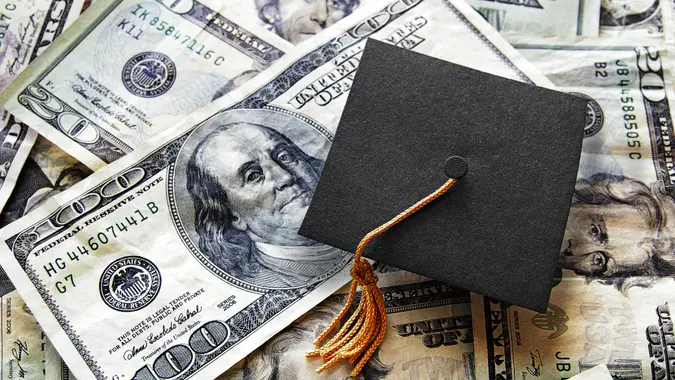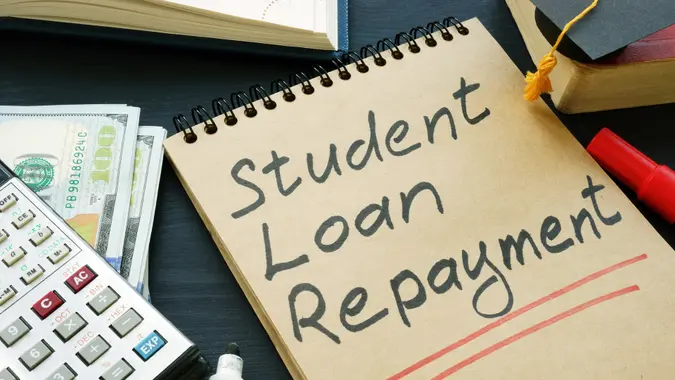8 Questions To Ask Yourself Before You Take Out Student Loans

Commitment to Our Readers
GOBankingRates' editorial team is committed to bringing you unbiased reviews and information. We use data-driven methodologies to evaluate financial products and services - our reviews and ratings are not influenced by advertisers. You can read more about our editorial guidelines and our products and services review methodology.

20 Years
Helping You Live Richer

Reviewed
by Experts

Trusted by
Millions of Readers
As the cost of education soars, student loans are increasingly necessary for many aspiring college students. However, borrowing thousands of dollars can have significant financial implications that extend far beyond graduation. There are factors you should always consider before committing to student loans.
Before you commit, it’s crucial to carefully consider the terms and potential consequences of student loans.
Here are eight questions to consider before taking out student loans.
Should I Pursue Federal or Private Loans?
There are two primary sources of student loans: federal and private. Federal loans, such as direct subsidized and unsubsidized loans, are provided by the U.S. Department of Education. These loans typically offer more favorable terms, including lower interest rates and flexible repayment options.
Private loans are issued by banks, credit unions and other lenders, often with less advantageous conditions.
What Are the Policies Surrounding Student Loans?
With U.S. voters sending President-elect Donald Trump back to the White House, it’s important to consider the incoming administration’s potential policies for federal student loans. In the past, Trump has strongly opposed the debt relief that President Joe Biden has attempted to push through in an effort to stimulate the economy.
“Trump’s election has eliminated any appetite for the forgiveness of student loan debt,” said Robert Johnson, Ph.D., CFA, a professor at Creighton University’s Heider College of Business. “Forgiveness of student loans is seen by many as a class-dividing issue, much like the bailout of the banks during the financial crisis. The proposal to forgive student loan debt is seen as unfair to many people, as it benefits people who attended college.”
Johnson also noted that forgiving student loan debt doesn’t address the skyrocketing cost of higher education — a root cause of the issue.
Ultimately, it’s important for anyone considering taking out student loans to be informed about the policies surrounding them.
How Are Interest Rates Looking?
Interest rates can significantly impact the total cost of a loan. Federal loans currently have fixed interest rates ranging from 6.53% to 9.08%, while private loans can have variable rates exceeding 10%. Borrowers should carefully review the interest rates and terms before selecting a loan.
Johnson advised watching for the impact of Trump’s election in this area too.
“Interest rates are certainly a major consideration in someone considering student loans,” Johnson said. “As many student loans carry variable rates, one must not only be comfortable with the rates that exist today, but a much higher rate environment that is possible given the inflationary potential of extending tax cuts as well as enacting tariffs.”
What Are the Repayment Terms?
Federal loans offer multiple repayment plans, including income-driven options that adjust monthly payments based on income and family size. Private loans often have less flexible repayment terms, which can lead to financial strain.
It’s important to think about when you’ll be required to repay your loans and your repayment strategy well in advance.
Are There Fees Associated With the Loans?
Beware of fees. Many student loans come with origination fees, late payment fees or other charges.
These additional costs can add up quickly, increasing the overall debt burden.
What Are the Borrowing Limits on the Loans?
Federal loans have annual and aggregate limits, which vary depending on a student’s dependency status and year in school.
Private loans may have higher borrowing limits, but this can lead to over-borrowing and increased debt.
What Kind of Shape Is My Credit In?
Private lenders typically require a credit check, which can impact the interest rate and approval. Students with limited or poor credit history may need a co-signer or may face higher interest rates, which could impact their finances long after they’re done school.
How Might the Loans Impact My Credit Score?
Because student loans are part of a credit report, they can impact credit scores in multiple ways.
Missed payments or high debt-to-income ratios can negatively impact credit scores, affecting future financial opportunities.
More on the Student Loan Crisis
Johnson placed much of the blame for current student loan woes on a lack of basic financial literacy.
“Today’s student loan crisis, at its core, is caused by a simple misunderstanding of how burdensome debt can be,” Johnson said. “Too many borrowers are funding expensive educations that do not provide the borrower with sufficient earning power to pay off the loans.”
Teaching students financial literacy earlier is key. “Teaching financial literacy in college is simply too late,” he explained. “By that time, many students have sealed their long-term fate by incurring burdensome student loans. I am an advocate of preparing students for the real world by teaching financial literacy in middle and high schools. And this education need not be extensive. Budgeting, taxes and debt (including mortgage debt and student loan debt) are the major topics that need to be covered.”
Minimizing the Student Loan Burden
If you do plan to take the student loan plunge, here are a few common tips for minimizing the burden.
- Explore scholarships and grants. Maximize free money options to reduce borrowing needs.
- Complete the Free Application for Federal Student Aid (FAFSA). Determine your eligibility for federal loans and other financial aid.
- Borrow only what’s necessary. Calculate expenses and borrow the minimum required amount.
- Consider income-driven repayment plans. Adjust monthly payments based on income and family size.
- Make timely payments. Avoid late fees and negative credit reporting.
 Written by
Written by  Edited by
Edited by 

























